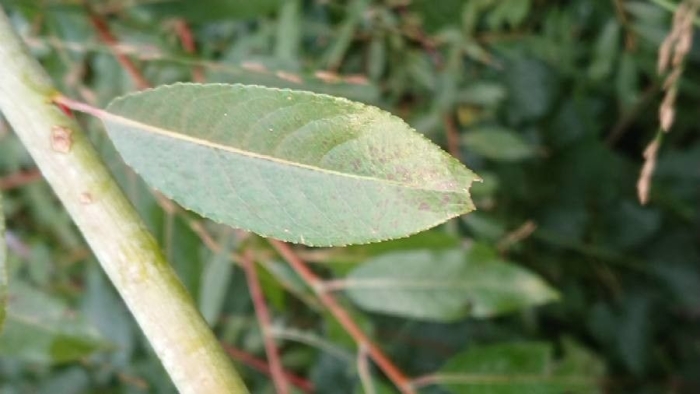European Violet Willow
(Salix daphnoides)
European Violet Willow (Salix daphnoides)
/
/

nikobon
CC BY-SA 4.0
Image By:
nikobon
Recorded By:
Copyright:
CC BY-SA 4.0
Copyright Notice:
Photo by: nikobon | License Type: CC BY-SA 4.0 | License URL: https://creativecommons.org/licenses/by-sa/4.0/ | Attribution: nikobon (cc-by-sa) | Rights Holder: nikobon | Publisher: PlantNet | Date Created: 2018-09-23T22:00Z | Title: Salix daphnoides Vill.: leaf | Notes: |


















Estimated Native Range
Summary
Salix daphnoides, commonly known as European Violet Willow, is a deciduous shrub or small tree native to riparian zones, wetlands, and along riverbanks across Europe. It typically grows to a height of 6–8 m (20–26 ft) and can occasionally reach up to 12 m (39 ft) with a rounded crown and spreading branches. The bark is smooth and grey, and during winter, the young shoots turn a striking violet or purple color, which is particularly ornamental. The catkins appear before the leaves in early spring, with male catkins being more conspicuous than the female ones. This species is valued for its winter interest due to the colorful stems and its early spring flowers.
European Violet Willow is often used for stabilizing riverbanks and coastal sand dunes due to its robust root system. It is also widely planted as an ornamental species in parks and along roadsides for its attractive bark and catkins. The cultivar ’Aglaia’ has been recognized for its horticultural merit. In cultivation, it prefers full sun to part shade and adapts to a range of soil moisture conditions, from medium to high water requirements. It thrives in soils with varying drainage speeds but prefers consistently moist, well-drained soils. While generally easy to maintain, it can be susceptible to willow scab and other fungal diseases. It is also potentially invasive outside its native range, so gardeners should consult local regulations before planting.CC BY-SA 4.0
European Violet Willow is often used for stabilizing riverbanks and coastal sand dunes due to its robust root system. It is also widely planted as an ornamental species in parks and along roadsides for its attractive bark and catkins. The cultivar ’Aglaia’ has been recognized for its horticultural merit. In cultivation, it prefers full sun to part shade and adapts to a range of soil moisture conditions, from medium to high water requirements. It thrives in soils with varying drainage speeds but prefers consistently moist, well-drained soils. While generally easy to maintain, it can be susceptible to willow scab and other fungal diseases. It is also potentially invasive outside its native range, so gardeners should consult local regulations before planting.CC BY-SA 4.0
Plant Description
- Plant Type: Tree, Shrub
- Height: 7-20 feet
- Width: 4-15 feet
- Growth Rate: Rapid
- Flower Color: Cream, Yellow
- Flowering Season: Spring
- Leaf Retention: Deciduous
Growth Requirements
- Sun: Full Sun, Part Shade
- Water: Medium, High
- Drainage: Slow, Medium, Fast
Common Uses
Bank Stabilization, Bee Garden, Bird Garden, Butterfly Garden, Deer Resistant, Erosion Control, Salt Tolerant, Water Garden
Natural Habitat
Riparian zones, wetlands, and along riverbanks across Europe
Other Names
Common Names: Violet Willow, Daphne Willow, Large Gray Willow, Dug-Pil, Reif-Weide, Reifweide, Schimmel Weide, Härmäpaju, Saule À Bois Glauque, Saule Faux Daphné
Scientific Names: , Salix pulchra, Salix daphnoides, Salix caspica, Salix reuteri, Salix jaspidea, Salix pruinosa, Salix aglaja, Salix bigemmis, Salix koernickei
GBIF Accepted Name: Salix daphnoides Vill.